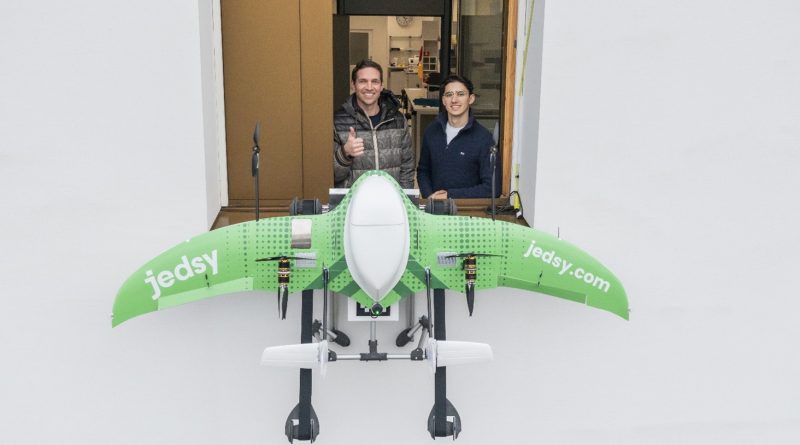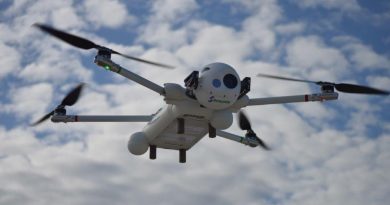Interview with the Jedsy Management Team
What inspired you, to start the Jedsy company, and what do you hope to achieve with it?
Essentially, the need to contribute to helping humanity by addressing an urgent need for medical supplies to improve healthcare accessibility and increase efficiency is what inpired Herbert and Mirko, Co-Founders of the company in 2021. The emergence of Covid-19 in 2020 is what furthered the idea because, globally, there was the realization that fast and timely delivery of medical supplies can save lives in dire situations. Thus. the duo’s ultimate aim is to develop innovative and unique technology that will revolutionize the healthcare industry.
Jedsy hopes and aims at enhancing patient outcomes. Jedsy recognizes that timely delivery of medical supplies can be critical in ensuring positive patient outcomes, such as in the case of delivering life-saving medications, blood, or organs for transplant.
What makes Jedsy stand out from its competitors?
The Jedsy technology is exceptional in the development of the Jedsy Glider: a vertical and landing delivery drone whose fixed-wing conception provides it a maximum 120 km flight range, and up to 75 minutes of battery life at top altitudes of 2,428 meters. Furthermore, the crafts are equipped with state-of-art Artificial Intelligence (AI) and gear such as cameras and sensors that make them smarter and more autonomous to enable them to perform complex tasks and make decisions on their own in case of an emergency.
In terms of delivery systems, the company currently uses two mechanisms: the “Mailbox” which is exclusive as it was invented by Jedsy and it can be installed almost anywhere such as on a balcony or window or at the back of a car. The advantage of this system is that it provides a sturdy takeoff and landing solution in areas where ground options are limited or inconvenient, but also aids in fast and easy loading or reception of payloads. Besides, the mailbox serves as a charging system for the drones. Interestingly, the drones are also able to deliver packages by landing on the ground in areas or situations where the mailbox cannot be installed due to the unavailability of proper structures or as a result of unforeseen circumstances beyond control at that particular time, the mailbox is not functional. Lastly, the company plans to adopt the parachute drop delivery system where basically, a package is attached to a deployable parachute or glider and once the package arrives at its destination, it is released from mid-air to safely lower it to the ground.
How does Jedsy ensure the safety and reliability of its drones?
Jedsy ensures the safety and reliability of its products by conducting rigorous tests which fundamentally help in identifying potential failures or weaknesses in the drone system, allowing for these issues to be rectified before the drone is put into use. This prevents accidents or malfunctions that could result in injury or damage to property. Furthermore, the process has also contributed to improving performance, particularly battery life, range, and payload capacity. This helps in making drones efficient and reliable during operations.
Can you walk our readers through the design and development process of Jedsy drones?
Jedsy’s drones are designed and developed in-house, with a focus on high-quality materials, precision engineering, and advanced software. Our process begins with a thorough analysis of customer needs and market demands, which informs the design of the drone itself. We then work closely with our engineering and manufacturing teams to create prototypes and conduct extensive testing to ensure that our drones meet our high standards for safety, reliability, and performance.
How does Jedsy balance the need for innovation and the need for regulatory compliance in the drone industry?
Innovation is at the core of Jedsy’s operation however, the company recognizes that there is a need for compliance as such there are key steps that are taken:
The company ensures that it collaborates with industry players and regulators both local and international to promote innovation while also safeguarding the safety and adequacy of privacy concerns.
secondly, a risk-based approach is taken to help ensure that regulations are tailored to the level of risk posed by different types of drone and drone operations
Can you tell us about a particularly challenging project Jedsy has undertaken with its drones?
One particularly challenging project that Jedsy has undertaken was the launch of our drone delivery service between two labs in Switzerland. This project required us to design and implement a highly efficient and secure delivery system, ensuring that sensitive samples and materials were transported safely and reliably between the two locations. We worked closely with our partners to develop a custom drone and software system that could handle the unique requirements of this project, including a practical loading and unloading processes, real-time tracking and monitoring, and adherence to strict regulations for the transport of hazardous materials. We are proud of that project and we continue to expand our delivery capabilities to other locations and industries.
How does Jedsy support and train its customers to use drones effectively?
At Jedsy, we are committed to supporting our customers every step of the way. We provide comprehensive training programs to ensure that our customers are confident and competent in using our drones effectively. This includes both classroom instruction and hands-on training, as well as ongoing support and technical assistance.
How does Jedsy plan to expand its operations and reach new markets in the future?
As part of a broader strategy, the company seeks to look for regions that have unmet demand for medical supplies, including rural areas and others in addition to partnering with local hospitals, clinics, and non-governmental organizations. Further, as a conscientious company, the plan is to continue seeking regulatory approval from the relevant agencies to obtain necessary licenses and approvals for operating in new markets. Lastly, the company will continue investing in technology to meet the evolving needs of the medical industry and customizing services as we understand that there are unique needs of different markets
Can you discuss any partnerships or collaborations Jedsy has established within the industry?
In 2022, Jedsy signed a memorandum of understanding with Garuda Aerospace and KL Tech City to enable cooperation that is fostering sharing of knowledge and technology as well as market expansion and joint ventures. Later, in the same year in December, the company signed a MoU with the Ministry of Health in Malawi to start delivering medical supplies in several districts.
In early 2023, Jedsy came to an understanding with Dr. Risch Group to start delivering lab samples in Switzerland and Liechtenstein where are 22 laboratories in total. Also in 2023, Jedsy made a deal with Helisul, a Brazil-based company where Jedsy is supplying drones.
Can you talk about any exciting new features or products Jedsy is currently working on?
We are constantly innovating and developing new products and features to meet the needs of our customers. Currently, we are working on a new drone model that will be capable of longer flights and more advanced imaging capabilities. We are also exploring new applications for our drones, stay tuned for more updates!
Finally, what do you consider to be the biggest opportunities and challenges facing the Drone/UAV industry in the years to come?
In terms of opportunities, the chances are high that there will be an increased demand for drone services as various countries are slowly embracing and recognizing how vital the technology is becoming to humanity.
Additionally, the drone industry has seen significant technological advancements in recent years such as battery life, sensors and control, which will continue to progress in the coming years.
The integration with other technologies such as AI, machine learning, data analytics and others will continue which will create opportunities for companies to develop new applications and services that leverage these technologies.
One of the notable challenges is regulatory environment. The drone industry is highly regulated thus, companies operating in this space will need to navigate these regulations and ensure compliance to avoid penalties.
Secondly, there are safety and security concerns as far as drone technology is concerned as such, companies need to ensure that that their operations are safe and secure to avoid accidents or incidents.
Lastly, there are privacy concerns especially with drones for surveillance and data collection. This calls for companies to ensure that they are collecting and using data in a responsible and ethical manner to avoid negative publicity and legal action.




